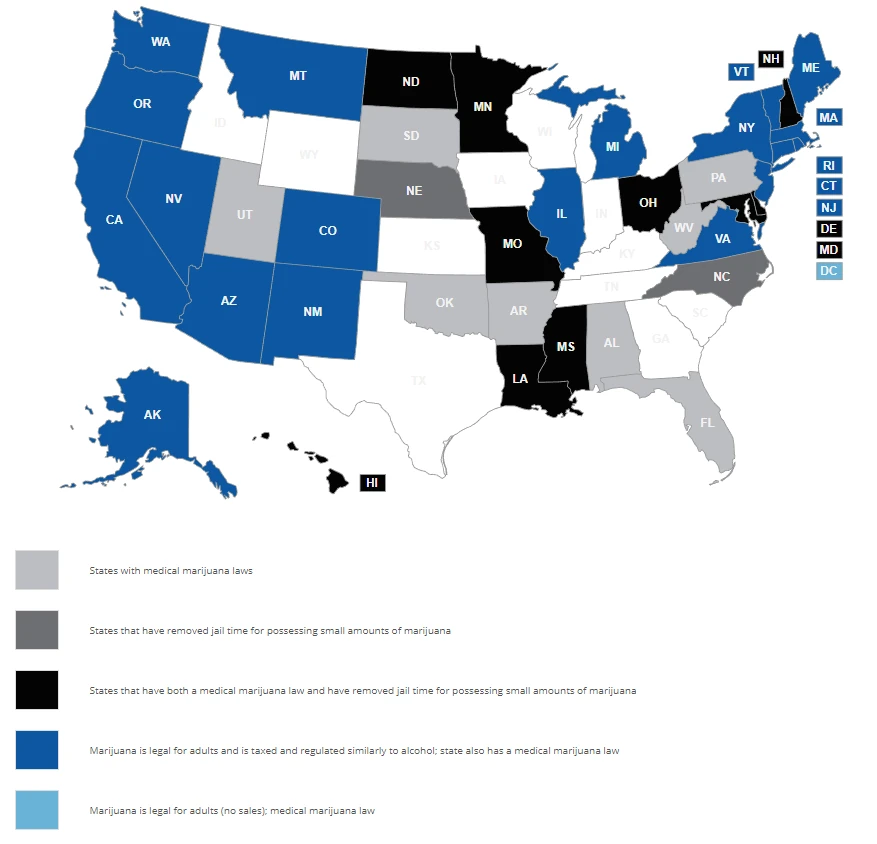Marijuana Law Reform in the US


| State | Legalized | Medical | Decrim. | More info |
|---|---|---|---|---|
| Alabama | No | No | Yes | Current laws, news |
| Alaska | Yes | Yes | Yes | Current laws, news |
| Arizona | Yes | Yes | No | Current laws, news |
| Arkansas | No | Yes | No | Current laws, news |
| California | Yes | Yes | Yes | Current laws, news |
| Colorado | Yes | Yes | Yes | Current laws, news |
| Connecticut | Yes | Yes | Yes | Current laws, news |
| Delaware | No | Yes | No | Current laws, news |
| District of Columbia | Yes1 | Yes | Yes | Current laws, news |
| Florida | No | Yes | No | Current laws, news |
| Georgia | No | No | No | Current laws, news |
| Hawaii | No | Yes | Yes | Current laws, news |
| Idaho | No | No | No | Current laws, news |
| Illinois | Yes | Yes | No | Current laws, news |
| Indiana | No | No | No | Current laws, news |
| Iowa | No | No | No | Current laws, news |
| Kansas | No | No | No | Current laws, news |
| Kentucky | No | No | No | Current laws, news |
| Louisiana | No | Yes | Yes | Current laws, news |
| Maine | Yes2 | Yes | Yes | Current laws, news |
| Maryland | No | Yes | Yes | Current laws, news |
| Massachusetts | Yes | Yes | Yes | Current laws, news |
| Michigan | Yes | Yes | No | Current laws, news |
| Minnesota | No | Yes | Yes | Current laws, news |
| Mississippi | No | Yes | Yes | Current laws, news |
| Missouri | No | Yes | No3 | Current laws, news |
| Montana | Yes | Yes | No | Current laws, news |
| Nebraska | No | No | Yes | Current laws, news |
| Nevada | Yes | Yes | Yes | Current laws, news |
| New Hampshire | No | Yes | Yes | Current laws, news |
| New Jersey | Yes | Yes | No | Current laws, news |
| New Mexico | Yes | Yes | Yes | Current laws, news |
| New York | Yes | Yes | Yes4 | Current laws, news |
| North Carolina | No | No | Yes | Current laws, news |
| North Dakota | No | Yes | Yes | Current laws, news |
| Ohio | No | Yes | Yes | Current laws, news |
| Oklahoma | No | Yes | No | Current laws, news |
| Oregon | Yes | Yes | Yes | Current laws, news |
| Pennsylvania | No | Yes | No | Current laws, news |
| Rhode Island | Yes | Yes | Yes | Current laws, news |
| South Carolina | No | No | No | Current laws, news |
| South Dakota | No | Yes | No | Current laws, news |
| Tennessee | No | No | No | Current laws, news |
| Texas | No | No | No | Current laws, news |
| Utah | No | Yes | No | Current laws, news |
| Vermont | Yes | Yes | Yes | Current laws, news |
| Virginia | Yes | No | Yes | Current laws, news |
| Washington | Yes | Yes | Yes | Current laws, news |
| West Virginia | No | Yes | No | Current laws, news |
| Wisconsin | No | No | No | Current laws, news |
| Wyoming | No | No | No | Current laws, news |
| Legalized | Medical | Decrim. |